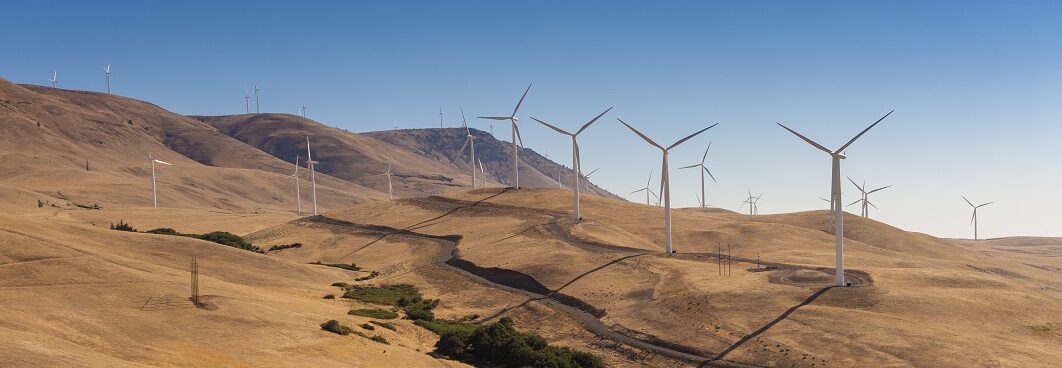The Energy Independence Act (EIA or I-937) requires electric utilities serving at least 25,000 retail customers to use renewable energy and energy conservation. There are 18 utilities subject to the EIA. They provide 80 percent of the electricity sold to Washington retail customers.
Energy conservation
Utilities must pursue all conservation efforts that are cost-effective, reliable and feasible. They need to identify the conservation potential over a 10-year period and set two-year targets.
Renewable energy
The EIA sets renewable energy goals, requiring a certain percentage of a customer’s energy to come from renewable sources. The targets have increased over time, from 3% in 2012 to 9% in 2016, and then to 15% in 2020. Eligible resources include water, wind, solar energy, geothermal energy, landfill gas, wave, ocean or tidal power, gas for sewage treatment plants, and biodiesel fuel and biomass energy.
Many of the renewable resources have strict eligibility rules. For example, hydropower is only eligible if it results from increased efficiency improvements made after 1999. Additionally, the hydropower project must be owned by one of the 18 utilities that qualify under the EIA or be marketed by the Bonneville Power Administration. Hydro projects in pipes and canals do not have restricted ownership, but they must be located in Washington.
Other renewable resources must be located in the Pacific Northwest or delivered to Washington in real time. The Bonneville Power Administration service area map is helpful in understanding the geographic boundaries (unselect all layers except BPA Service Area).
A utility is not required to meet a renewable energy target if it spends at least 4% of its retail revenue requirement on the incremental cost of renewable energy and renewable energy credits. The cost limit for a utility with no load growth is 1%.
Utilities and project developers can find out if a renewable or conservation project is eligible to meet the targets by applying for an EIA advisory opinion. An EIA advisory opinion is issued after renewable energy or conservation projects go through a review process. The final decision, made by the governing board of the public or cooperative utility that uses the resource for compliance, determines whether the projects are eligible to meet the requirements of the law.
The normal application fee is $1,250, but complex applications may be charged for additional costs. Commerce issues an advisory opinion within 90 days after it receives a complete application. The process includes a legal analysis and opportunity for public comment.
Commerce also issues advisory opinions for renewable projects that want a “Washington-eligible” indicator on their renewable energy credits. This process is described in more detail in the Renewable Energy Credits (REC) section below.
Entities proposing to sell renewable energy or credits to an investor-owned utility may request a declaratory order from the Washington Utilities and Transportation Commission (UTC).
Submit your questions or comments to eia@commerce.wa.gov.
The Washington Energy Independence Act 19.285 RCW allows utilities to meet their renewable energy obligations with either actual energy from renewable projects or renewable energy credits (RECs). Unbundled RECs from hydro generation may not be used for compliance.
A utility using RECs to meet its target may only use WREGIS RECs. They may use any REC created by WREGIS from a generating facility that meets the Washington statutory definition of an eligible renewable resource. Generators and utilities must use the Western Renewable Energy Generation Information System (WREGIS) to create, track and retire any REC that is used to satisfy the state renewable energy standards.
A REC created by WREGIS demonstrates that the generating facility has produced the electricity and that no other account holder is counting that unit of energy to meet its renewable portfolio standard requirements or a voluntary renewable program. WREGIS does not certify that a REC meets any individual state definition of renewable energy.
Washington law does not allow utilities to use RECs from hydroelectric projects unless they are bundled with the associated electricity and produced in the compliance year. However, utilities are encouraged to document eligible hydro generation using the WREGIS tracking system. Retirement of the REC then demonstrates that the environmental attributes of the hydro generation are not being double-counted.
Washington-eligible designations and advisory opinions
Washington-eligible designation is an optional feature for RECs. Commerce is the WREGIS state program administrator for Washington. The owner or representative of a generating facility may apply to Commerce for optional designation as eligible under the Washington renewable energy standard. Once designated by Commerce, the RECs created by WREGIS for that generating facility will carry a “Washington-eligible” indicator.
Oversight and reporting
The Utilities and Transportation Commission (UTC) oversees compliance for investor-owned utilities. The governing boards of municipal utilities and public utility districts are responsible for compliance, with auditing by the State Auditor and any enforcement by the Attorney General. Cooperative utilities are independently audited.
Commerce collects annual reports from the utilities on EIA activities and issues advisory opinions when requested. Commerce is also the state administrator for the renewable energy credit tracking system, the Western Renewable Energy Generation Information System (WREGIS).
Every electric utility subject to the Energy Independence Act (EIA or I-937) is required to submit an annual report to the Washington Department of Commerce by June 1 on its progress in meeting the targets for conservation and renewable energy under the EIA.
- EIA Reports (Box)
- EIA Reporting Templates (Box)
- Submit a report via Smartsheet by close of business, June 1, 2025.
- Electric Utility Reporting List (PDF)
For questions related to electric utility reporting requirements, please contact Aaron Tam, Energy Utility Data Specialist, at EIA@Commerce.wa.gov or by calling 206-454-2251.
